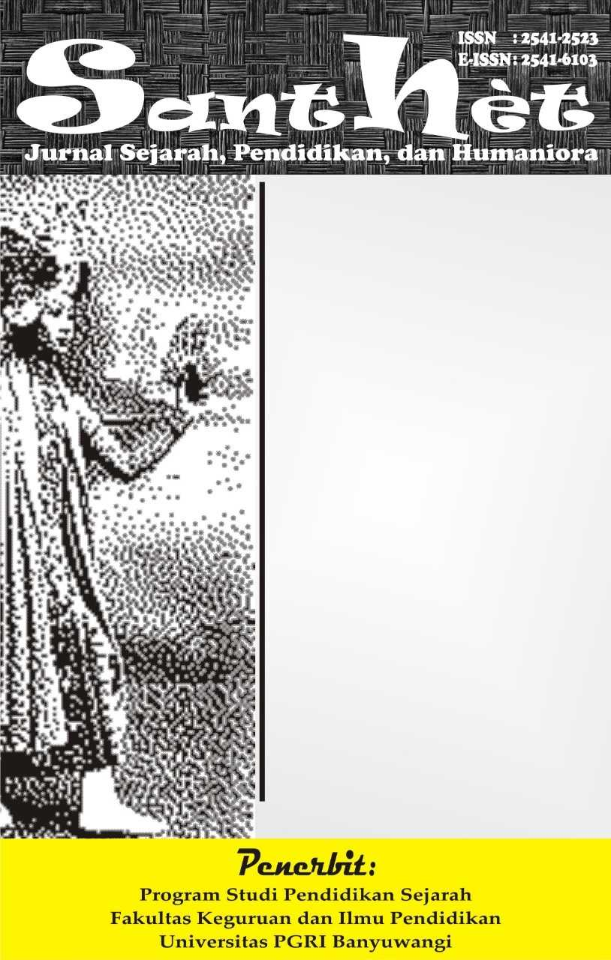YOUNG GENERATION IN THE PRESERVATION OF THE TABOT TRADITION OF BENGKULU CITY FROM THE PERSPECTIVE OF SOCIAL IDENTITY THEORY
Generasi Muda Dalam Pelestarian Tradisi Tabot Kota Bengkulu Dalam Perspektif Teori Identitas Sosial
DOI:
https://doi.org/10.36526/santhet.v9i4.5644Keywords:
Cultural psychology, social identity, tradition preservation, young generation, TabotAbstract
This research raises the urgency of preserving the Tabot tradition in Bengkulu City, which plays an important role in shaping social identity and social harmony amid the challenges of globalization. This research aims to understand how the younger generation plays a role in preserving the Tabot tradition as a cultural symbol and collective identity and how this tradition strengthens social ties in a multicultural society. This research used a qualitative approach with a case study design, where data was obtained through semi-structured interviews with participants actively involved in the Tabot tradition. The sampling technique used was purposive sampling, and data analysis was conducted using thematic analysis techniques. This study found that the participation of the younger generation in the Tabot tradition not only strengthens the sense of local cultural pride and identity but also enhances social cohesion in a diverse society. The main implication of this study is the importance of understanding the role of cultural traditions in shaping social identity and building social capital, which can be a foundation for strengthening the sustainability of local culture in a modern context.
References
Abrams, D., & Hogg, M. A. (1988). Comments on the motivational status of self‐esteem in social identity and intergroup discrimination. European journal of social psychology, 18(4), 317-334.
Afdhal, A. (2023). An examination of traditional customs in minangkabau leadership tradition: continuity and changes in the modern era. PUBLICUS, 1(2), 119-134.
Budiman, D. A. (2019). Tabot, sakralitas dalam komodifikasi pariwisata. Jurnal Kaganga: Jurnal Ilmiah Sosial dan Humaniora, 3(2), 40-49.
Erlita, N. (2017). City branding provinsi bengkulu pada festival tabot dalam upaya melestarikan pariwisata budaya daerah. Jurnal Visi Komunikasi, 16(1), 14-25.
Good, A., Sims, L., Clarke, K., & Russo, F. (2020). Indigenous youth reconnect with cultural identity: the evaluation of a community‐ and school‐based traditional music program. Journal of Community Psychology, 49(2), 588-604. https://doi.org/10.1002/jcop.22481
Hasyim, R. and Rahmat, R. (2018). Preservation of bancakan tradition in strengthening indonesia’s national identity.. https://doi.org/10.2991/acec-18.2018.132
Hakim, A. R. and Darojat, J. (2023). Pendidikan multikultural dalam membentuk karakter dan identitas nasional. Jurnal Ilmiah Profesi Pendidikan, 8(3), 1337-1346. https://doi.org/10.29303/jipp.v8i3.1470
Hidayat, T., & Purwokerto, U. M. (2019). Pembahasan studi kasus sebagai bagian metodologi penelitian. Jurnal Study Kasus, 3(1), 1-13.
Hanip, S., Yuslih, M., & Diniaty, L. (2020). Tradisi ngejot: positive relationship antar umat beragama. Potret Pemikiran, 24(2), 71. https://doi.org/10.30984/pp.v24i2.1317
Husniya, E. A., Basir, A., & Moefad, A. M. (2023). Dakwah komunitas honda club indonesia dalam perspektif teori identitas sosial di mojokerto. Jurnal Kopis: Kajian Penelitian dan Pemikiran Komunikasi Penyiaran Islam, 6(1), 76-91.
Hornsey, M. J. (2008). Social identity theory and self‐categorization theory: a historical review. Social and personality psychology compass, 2(1), 204-222.
Julianty, A., Dewi, D., & Furnamasari, Y. (2022). Pengaruh globalisasi terhadap eksistensi identitas nasional bangsa indonesia saat ini. Edumaspul - Jurnal Pendidikan, 6(1), 964-968. https://doi.org/10.33487/edumaspul.v6i1.2442
Khairuddin, K., & Man, Y. L. (2023). Tabot Tradition and Acculturative Religious Tradition of The Bengkulu Community. Journal of Contemporary Islam and Muslim Societies, 7(1), 65-108.
Marhayati, N. (2016). Dinamika kelompok minoritas dalam mempertahankan tradisi studi pada keluarga kerukunan tabot di bengkulu. Prosiding Temilnas Ikatan Psikologi Sosial-HIMPSI, 1(1).
Nabila, A. O. and Wulandari, M. D. (2022). Elemen berkebhinnekaan global pada buku tematik siswa kelas iv sekolah dasar tema indahnya keragaman di negeriku. Jurnal Cakrawala Pendas, 8(3), 788-797. https://doi.org/10.31949/jcp.v8i3.2607
Rahman, A. T., & Qurniati, A. (2022). Peran tokoh masyrakat dalam melestarikan budaya tabot di kota bengkulu. Jurnal Pancasila dan Kewarganegaraan (JUPANK), 2(2), 129-140.
Rozali, Y. A. (2022, January). Penggunaan analisis konten dan analisis tematik. In Penggunaan Analisis Konten Dan Analisis Tematik Forum Ilmiah (Vol. 19, p. 68).
Sari, R. W., & Susilo, A. (2024). Analisis nilai-nilai pada tradisi tabut di kota bengkulu. Jurnal Kajian Penelitian Pendidikan dan Kebudayaan, 2(1), 136-141
Suparno, S., Alfikar, G., Santi, D., & Yosi, V. (2018). Mempertahankan eksistensi budaya lokal nusantara ditengah arus globalisasi melalui pelestarian tradisi gawai dayak sintang. Jurnal Pekan: Jurnal Pendidikan Kewarganegaraan, 3(1), 43-56.
Subqi, I. (2020). Nilai-nilai sosial-religius dalam tradisi meron di masyarakat gunung kendeng kabupaten pati. Heritage, 1(2), 171-184. https://doi.org/10.35719/hrtg.v1i2.21
Supriatin, Y. M. and Istiana, I. I. (2022). Kearifan lokal masyarakat adat sinar resmi sebagai identitas bangsa. Prosiding Seminar Nasional Pendidikan, Bahasa, Sastra, Seni, Dan Budaya, 1(2), 01-14. https://doi.org/10.55606/mateandrau.v1i2.104
Suradi, A., Tabata, M., & Surahman, B. (2020). The history and values of tolerance in tabot traditional ceremonies in bengkulu society. Paramita Historical Studies Journal, 30(2), 170-179. https://doi.org/10.15294/paramita.v30i2.21403
Wu, J., Ju, L., Lin, P., & Lyu, Y. (2022). The relationship between form and ritual in cultural sustainability. Sustainability, 14(15), 9157. https://doi.org/10.3390/su14159157
Winarsih, N. (2023). Tradisi rewang. Biokultur, 12(1), 21-36. https://doi.org/10.20473/bk.v12i1.45720





























